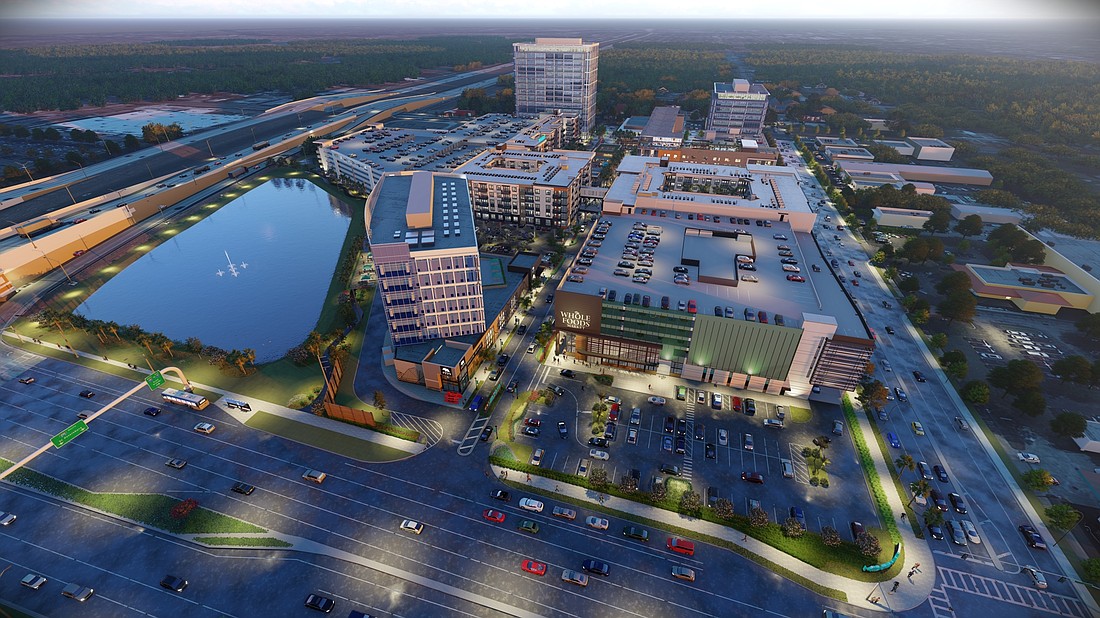- December 25, 2024
-
-
Loading

Loading

Two decades after acquiring a somewhat “forgotten land” between downtown Tampa and the Westshore Business District, New York-based Bromley Cos. has begun going vertical with an ambitious, mixed-use development that even it acknowledges wouldn’t have worked until now.
That’s largely because in the years since its assemblage, Tampa has skewed to a younger population and American consumers have both accepted and gravitated toward more urban collections of assets that offer live/work/play dynamics.
The $500 million Midtown Tampa project is being designed for just such a mix: A trio of office buildings; retail and restaurant space throughout; a four-acre common area and park; a 225-room, upscale boutique hotel; and 400 apartments.
In all, the 22-acre site at Interstate 275 and Dale N. Mabry Highway is projected to contain 1.8 million square feet before its completion in 2021.
“Midtown will be a dream big project,” Bromley CEO Nicholas Haines told a group assembled for a May 15 ceremony to mark vertical construction.
Though no new tenant names were released — Whole Foods Market will anchor the retail component of Midtown Tampa — Haines says 50% of the project’s retail space has been committed to date.
In addition, some 40% of the speculative office space in the company’s initial 150,000-square-foot office building also is spoken for, he says.
Bromley clearly has ambitions for Midtown Tampa beyond creating the area’s first open-air, mixed-use development, though.
Bill Haines, the company’s chairman and founder, contends Midtown Tampa will become the “state of mind” that connects downtown Tampa to the suburban Westshore Business District surrounding Tampa International Airport.
The elder Haines — Nicholas’ father — also thinks Midtown Tampa will take its place among roughly a dozen other projects nationally with similar attributes.
“This is going to be one of the finest developments of this kind in all the United States,” Bill Haines says.
Haines says Bromley drew inspiration for Midtown Tampa from projects such as North American Properties’ 86-acre, 2.3 million-square-foot Avalon development in Alpharetta, Ga.; Federal Realty’s 42-acre, $450 million Santana Row in San Jose, Calif.; Macerich’s Kierland Commons in Scottsdale, Ariz.; and Edens’ Mosaic District in Fairfax, Va.
Tampa Mayor Jane Castor says Midtown Tampa’s vertical construction represents a “defining moment for our city” and one that will, together with the $3 billion Water Street Tampa project, $2 billion redevelopment of the Tampa International Airport and the transformation of the University Mall into Uptown, continue to make the city “a force to be reckoned with” throughout the Southeast.
“This is going to be one of the finest developments of this kind in all the United States.” — Bromley Cos. Chairman Bill Haines
It certainly wasn’t that way when Bromley began assembling the Midtown Tampa site in 1997. In all, the company acquired more than 30 separate parcels to complete the 22-acre tract.
At first, Bromley focused on renovating existing space on the property, including an existing Class B office building. Renting the space was easy; tenants cited the property’s quick access to both the interstate and Dale Mabry.
Even today, Midtown Tampa has the highest daily traffic count of any site in or around Tampa, at 250,000 vehicles.
As time went on, Bromley realized that retailers from around the nation were aware of the site because of its location and traffic count.
“We’d talk to national retailers and they all knew it,” Bill Haines says. “So that led us to realize that maybe the site was even more desirable than we believed it to be.”
But it is the confluence of sectors — from retail to residential to office and hospitality — that the Haineses say will make Midtown Tampa unique.
“We saw that Tampa didn’t have anything like this, but just as importantly, we came to realize that each individual component reinforces and strengthens the other components,” says Nicholas Haines.
Midtown Tampa as a concept also was made possible by the advent of residential, multifamily rental development integrated into urban-like projects. That didn’t exist for the most part in the early 2000s, Nicholas Haines notes.
To bring Midtown Tampa to fruition, Bromley — which intends to develop a total of 750,000 square feet worth of office space on the property — has assembled a team of experts in respective fields.
The project’s retail component is being developed by a joint venture between Lakewood Ranch-based Casto Southeast Realty Services and Jeffrey R. Anderson Real Estate Inc., of Cincinnati.
Crescent Communities has signed on to oversee the project’s 400-unit apartment complex, and Concord Hospitality Enterprises of Raleigh, N.C., will build a 225-key hotel on site.
Bill Haines acknowledges that neither Bromley nor Tampa was ready to develop the project that has been designed when the company first began assembling the lots there.
“What we began with here is not nearly related to what we are doing today,” he says. “Over the next 20 years, there’s going to be a cascade of development. It’s going to be so positive for this entire area.”